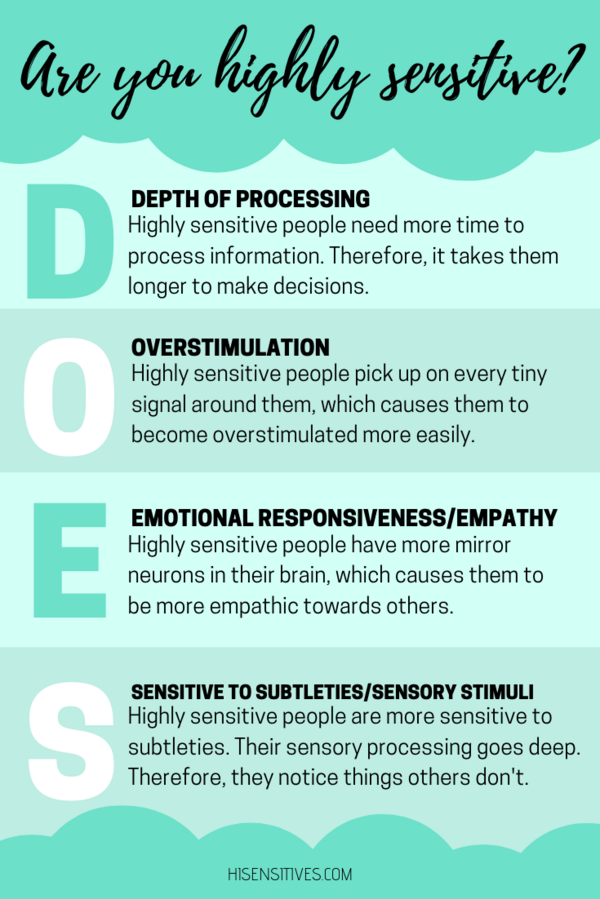Find answers to your questions regarding highly sensitive people on this page!
About the HSP trait
Perhaps, you have heard about the term highly sensitive person (HSP) more often recently, but keep wondering ‘but what is a highly sensitive person’? In this article, you’ll find the exact definition and explanation!
Researcher Dr. Elaine Aron -who first introduced the term back in 1996- explains high sensitivity in the following way:
The highly sensitive person (HSP) has a sensitive nervous system, is aware of subtleties in his/her surroundings, and is more easily overwhelmed when in a highly stimulating environment.
In fact, this trait has been found in over 100 species varying from fruit flies, birds and fish to dogs, cats, horses and primates. It is a strong survival strategy which includes to be observant before acting. Way back in time, when danger was around every corner, this skill was necessary for the group to survive. Also in human, this trait has been found.
What does highly sensitive person mean?
So, what does it mean to be highly sensitive? Research shows that the brains of HSP’s work a little different than other people’s brains.
They process external input deeply. Moreover, their sensitivity is a strategy to pause to check, observe, and reflect on or process what they noticed before undertaking action.
Furthermore, relating the observings to earlier experiences is an important aspect in the decision-making process of an HSP. When they see subtle signals for an opportunity that relates to an experience from earlier in their life, they grab it right away.
However, this also counts for negative experiences. When they notice red flags and relate it to earlier bad experiences, they most likely will see a situation as risky and feel more alert/anxious.
DOES: Characteristics of a highly sensitive person
HSP’s share many common characteristics and traits, but high sensitivity most commonly shows up through these four themes (D.O.E.S) introduced by Dr. Elaine Aron:
D: Depth of processing
Science proves that the HSP brain obtains a more active insula. This is the part of the brain that is responsible to increase perception and strengthen self-awareness. Accordingly, this causes highly sensitive people to pause and reflect before they engage with something or someone. Consequently, highly sensitive people have a tendency to consume large amounts of information around them and to reflect about it deeply. As a result, highly sensitive people might need more time to make decisions and find it challenging to switch quickly between tasks.
O: Overstimulation
Due to the fact that highly sensitive people continuously are aware of their surroundings, pick up on the tiniest subtleties and are increasingly emotionally affected by social stimulation and interaction, they become more easily overstimulated. The high amount of input received throughout a day is exhausting for HSP’s. Therefore, they feel the need to recharge more often compared to less sensitive people.
E: Emotional responsiveness/Empathy
Research proves with brain scans that HSP’s have more active mirror neurons compared to less sensitive people. Mirror neurons are the part of your brain responsible for feeling empathic for others. Also, they cause increased activity in areas of the brain that are related to emotional responses. Highly sensitive people experience both positive and negative emotions and feelings more deeply compared to non-HSP’s.
S: Sensitive to subtleties/Sensory stimuli
Highly sensitive people have an increased awareness of the subtle details in their surroundings that others seem to miss. For example, this includes non-verbal cues or minor adaptions in their environment. Moreover, sensory input impacts highly sensitive people more intensely. Hence, they notice strange smells, loud and sudden noises, bright and flickering lights or rough textures very quickly.
Can a highly sensitive person change?
A question many people google is the question: ‘Can highly sensitive people change?’.
This almosts sounds like being an HSP is a disease or a bad thing! However, being highly sensitive is a true gift.
Nevertheless, it is no surprise that this is being googled often by HSP’s and/or their loved ones.
While it brings along many wonderful characteristics and traits, highly sensitive people also experience certain struggles.
These struggles might feel frustrating for the HSP and/or their loved ones at times.
Struggles of highly sensitive people
High sensitivity may result in certain struggles. On one hand, the strength of a highly sensitive person lies in using past experiences as a moment for growth and base for future decisions.
On the other hand, HSP’s tend to overgeneralize and avoid certain situations rather quickly. This occurs because they remind them of past bad situations or a trauma in some way. The art of thriving as an HSP is to find balance between these two extremes.
Another struggle highly sensitive people face, is that an HSP’s nervous system ‘fills up with noise’ rather quickly. Due to over-stimulation, they become easily exhausted and feel the need to withdraw to peace and quiet faster compared to non-HSP’s. This emphasizes the importance of self-care for highly sensitive people.



